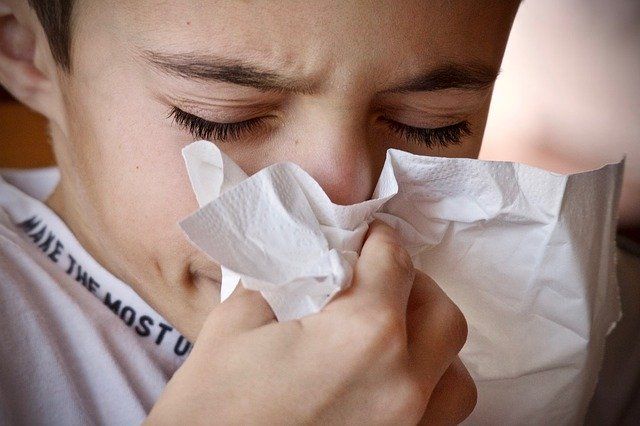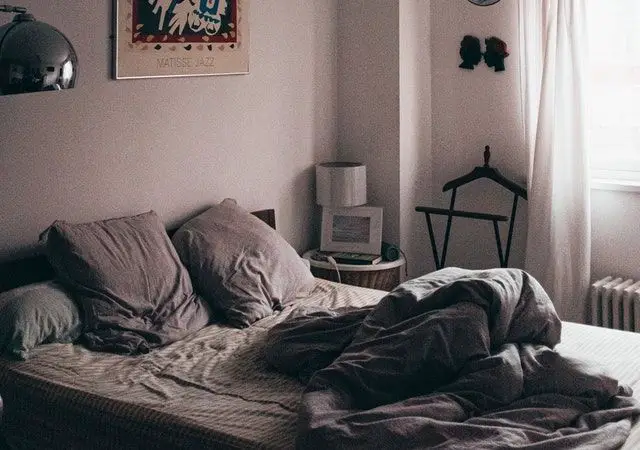We all know that sleeping requires a specific temperature for it to be comfortable. During summer months, you might be tempted to crank up your fan to cool down. However, there are many things to consider before you make fan-sleeping a habit.
So, what are the effects of sleeping with a fan? Cooling of the body temperature is an essential part of quality sleep, as it helps the body release tissue-repairing hormones. A fan produces airflow that enables cooling, which can be useful during shut-eye. However, cooling down using a constant blow of air may be detrimental to health, especially for sensitive people.

To fully grasp the effects of sleeping with a fan, this article will discuss:
- Why sleep with the fan on?
- Health effects of sleeping with the fan on
- Things to consider before sleeping with a fan
Why Sleep With the Fan On?

It cools you down
Obviously, people who choose to sleep with the fan on do so to cool down.
Cooling of the body makes for an easier and smoother transition from being awake to deep sleep— in other words, cold temperatures make you fall asleep faster.
This is because human beings undergo thermoregulation, which is the regulation of our internal temperature in response to external factors. Thermoregulation affects the circadian rhythm, or more commonly known, the ‘biological clock’ that tells us when to go to bed.
If you’re expecting quality sleep, your body temperature at one point should go as low as 69 degrees Fahrenheit (21°C) — that’s nearly 20 degrees (6°C) colder than you are during the day.
Having a fan nearby, especially during warmer weather, helps your body cool down easily via thermoregulation and make for the easy secretion of certain hormones and cells. In fact, some people go as far as putting ice packs in front of their table fan before sleeping to help them snooze colder and better.
Using the fan is also a good choice for people with limited circulation in their bedrooms, either from having small or no windows available. Since the fan produces airflow, air particles in the room will not stay stagnant and create that “stuffy” sensation.
It produces white noise
The whirring of a fan is also an excellent source of white noise.
White noise is effective for getting people to feel sleepy. Its consistent frequency reduces the difference between regular background noise and sudden ‘peak’ noises like a door slamming, a chair falling, dog barking, etc., so that your sleep won’t be interrupted as much. This is one reason why people who share a thin wall with their neighbors prefer sleeping with their fans or TV on low.
Fans are much more cost-effective compared to air-conditioning too, which makes it a no-brainer option for people squeezing down their budgets.
Health Effects of Sleeping With the Fan On

Sleeping with the fan on is a good low-cost option for cooling, but there are things to keep in mind. Like any other equipment, you need to take several precautions to avoid injury. Discussed below are some health effects of sleeping with the fan on.
It can cause sore muscles and cramps
Sleeping with concentrated cool air blowing directly at you will cause your muscles to contract. This contraction means your muscle becomes tense. One of the most common areas where this is regularly observed is the neck and face— so if you’ve experienced waking up with a stiff neck, this is probably the culprit.
However, Dr. Len Horovitz of New York City’s Lenox Hill Hospital told Livescience that an air conditioner is also likely to do the same. In other words, this happens with other cooling devices. According to Dr. Horovitz, air should never be lower than 68 degrees Fahrenheit (20°C), and it shouldn’t be blowing directly onto you.
So, as long as you don’t set your fan too low and keep it relatively at a distance, it should be fine to sleep with a fan on.
It can cause allergies to flare

A fan moves air around the room, and it picks up dust and dirt. You have probably witnessed this dust accumulation if you’ve seen a fluffy layer of dust coating the blades of your fan. During spring, pollen is also circulated.
When you turn your fan on, the dust in your room never settles— instead, it keeps circulating around while you sleep and breathe for hours.
If you have allergies or are sensitive to dust, this might seriously affect you, and the only way to minimize the effect is by making sure your room is as dust-free as possible and regularly cleaning your fan blades. If sleeping with the fan is your only choice, clean your room regularly and vacuum any carpets.
It can worsen sinus problems

Sinusitis, or sinus, is an inflammation of the mucous membrane associated with fever, headaches, a plugged nose, and facial pain. A constant blow of cold air to the face could exacerbate the condition.
Besides, the use of fans dries out the air and thus the nasal passage. The body of a person prone to sinus irritations will respond by overcompensating on the production of mucus (a.k.a snot).
When this happens, blockages are more prone to occur, and you will wake up with unpleasant stuffiness. The problem with dry air can always be resolved, and more will be discussed later.
It can dry you out

Dry air means dry skin, dry eyes, and dry mouth. A fan is cost-effective only because it’s a simple mechanism that moves air around for cooling. With moving the air around though, the atmosphere becomes dryer, which may cause overall discomfort during and after sleeping.
If you rely on using a fan to go to bed, you must pay attention to moisturize your skin because the dryer atmosphere will definitely dry it out. If you have skin conditions such as Eczema, you may want to consult a pharmacist on what the best remedy is for staying in dry environments.
Also, some people sleep with their eyes partially or wholly open! In fact, at least 1 in 5 people are affected, and sleeping with a fan will irritate their eyes (especially if they are sleeping with contact lenses).
And it’s not just the eyes; some people also sleep with their mouths open (I’m sure you can name one person). This open passage combined with dry air is the perfect spell for waking up feeling like you’ve got sandpaper balled and stuffed down your throat
It can improve your sleep (and thus your health)

Cooler body temperature means better sleep and improved health.
Now, the fact that something that worsens sinus, flares allergies, and cramps muscles could be healthy may sound crazy.
The important thing to reiterate here is that a fan is simply a piece of cooling equipment, and if handled appropriately, will do more good than harm. The ideal temperature for sleep in your bedroom is somewhere between 60 and 67°F (15 to 19°C). This is the temperature where REM (Rapid eye movement) sleep happens, and much of the repair process happens here.
Putting a fan too close while you’re sleeping and letting the cold air blow directly to your skin is not good for your health, but if you put it at a distance strategically to promote a more natural airflow, you may find yourself sleeping more comfortably.
For example, sleep close to a window. Face your fan towards the window, as this will allow hot air from inside the room to be blown out, and cool air from outside will be exchanged inside.
When your room is cooled down, your body cools down with it, and hormones like Melatonin starts to be excreted. Melatonin, also known as the sleep hormone, stimulates fibroblast growth, which are special cells responsible for collagen and elastin production (If you know anything about skincare, these two are extremely good for youthful and wrinkle-free skin!).
Things to Consider Before Sleeping with a Fan
As previously discussed, using the fan without precautions like putting it too close to your skin can cause more harm than it provides relief.
You spend a third of your life sleeping, so making sure that everything is in order is important to ensure quality sleep. The next time you want to sleep with a fan, consider these steps:
Don’t place the fan too close
The previously discussed health effects of sleeping with a fan should already hint to you that putting it too close might be the worst thing you could do.
If placed too closely, you may suffer from dehydration, dry skin, irritated eyes, and even muscle cramps. You could make the fan blow out hot air and ventilate the room, or simply placing it slightly further.
If you can clearly feel the gusts of wind hitting your skin, you’re already overdoing it. Tower fans, also called oscillating fans, are affordable and cool down the air quietly without being too harsh, or rotating fans that won’t constantly bombard you with cold air. You may want to research available options before settling on a basic one.
Clean your room as much as possible.
Whatever fan you end up choosing, a fan is still a fan and will circulate air particles around— including dust, pollen, dirt, ash, and other allergens.
Some tower fans come with a built-in filtration system that would technically help with some of these problems, but it also requires cleaning for maximum effectiveness.
This article is owned by Sleeping Report and was first published on February 28, 2020
The one sure way to avoid allergies is by making sure there isn’t any dust or anything similar present in the first place, which means regularly cleaning every part of your bedroom and opening the windows regularly.
How Dangerous Is an ‘Unclean’ Room Then?

Dr. Clifford Bassett, author of New Allergy Solution and an allergist from New York City told The Independent that allergy threats coming from the use of fans are generally more real if you have serious allergies.
Our body is pretty resilient and is employed with natural mechanisms to get rid of minor allergens such as dust by “forcefully blowing out your nasal passage” — which may sound scary but actually refers to sneezing.
Even so, of course, it’s still better to have a clean bedroom that promotes healthier breathing and quality sleep. Here are a few ways you can implement that:
Prepare ways to humidify your room
Your fan dries up your room’s atmosphere. This can lead to unpleasant situations, like dry skin or eyes and such. However, room humidity is easy to manipulate.
The most straightforward method is getting an electric humidifier, which could cost anywhere between $15 to $100. Electric humidifiers are simple to use; simply pour a little bit of water and plug the machine to an electrical socket.
The humidifier will vaporize the water gently and add moisture to the air for hours at a time— some humidifiers even come with a timer option. You can add essential oils such as Lavender, which is good for relaxation and more peaceful sleep.
If you are looking for a cheaper DIY-alternative, you can humidify your room periodically by placing a freshly boiled pot of water close to your bed and let the steam humidify the air. This method is also especially useful during winter months, though you may have to repeat this a few times if the air is very dry.
But if you’re someone who doesn’t mind splurging a little to skip all these steps, there are tower fans designed with built-in humidifiers, so you can kill two birds with one stone.
Hydrate your body inside and out.
Making sure your body stays hydrated is a generally good tip, but it’s especially important if you regularly sleep with the fan on.
Since your skin will be prone to drying, apply lotion or skin oil all over your body before bed. Keep a glass of water nearby, too, in case you wake up with a dry throat in the morning.
Try to avoid the fan if you’re sick
Sleeping with a fan is not exactly going to make you sicker, but it may slow down your healing process and extend the suffering. The blast of air is capable of irritating sinuses, dry out your nasal passage, make you feel stiffer, sorer, et cetera.
If you share a room with another person or a pet, you are also spreading the virus around the room with the fan on. If you are feeling sick, try to avoid sleeping with the fan on as it will likely do more harm than good.
Clean the blades of your fan regularly
If you had used fans a lot in the past, you might be familiar with the fluffy grey layer of pollutants sticking to the fan blades.
These dust particles are similar to the lint collected at the end of your dryer’s cycle during laundry, and similarly, it needs to be discarded each time. Your fan not only circulates dust, but it also collects it as well.
This article is owned by Sleeping Report and was first published on February 28, 2020
There’s not much you can do to prevent dust accumulation from happening, so the best you can do is by cleaning it as you go. Don’t allow the accumulated dust unattended for too long, as chunks of dust may be blown out and get breathed into the nasal passage. If you have a child, this importance is emphasized.
If you’re generally healthy and have a hot or stuffy room, a fan is nearly a zero threat. Fans are only “harmful” in so far it may exacerbate allergies in some people, and even asthma attacks.
However, if you are someone who considers yourself generally healthy and have had no problem with fans in the past, then you should not worry too much about changing your sleeping habits.
In fact, using a fan is recommended if you particularly sleep in a stuffy or insufficiently- ventilated bedroom. The added coolness from using the fan will make your sleep that much better.
Summary
Sleeping with the fan on is neither good nor bad for you.
SleepingReport.com copyright article was updated on ..
Everybody has different sleeping needs, and there are ways to use the fan safely without inflicting any injury or illnesses to yourself. Whether you end up sleeping with or without fans, here are some key points of the article:
- Fans are useful for getting better quality sleep and cooling down our bodies. Fans are cost-effective and useful for cooling the body down. If used properly with good health, it can promote better sleep and improved health.
- Fans can cause minor health disturbances if used inappropriately. Muscle sores, dehydration, and sinus are bound to happen if you place the fan too closely and expose yourself to cold air for longer.
- Allergies may flare up badly with a fan, so people who are severely sensitive to physical allergens or pollutants may want to consider other cooling alternatives such as air conditioners.
- There are ways to cancel-out the ‘cons’ of using fans, such as investing in a humidifier and regularly cleaning both fan blades and your room.
- There are many types of fans available, such as the tower fan that comes with various built-in mechanisms, like air-filtration, humidifier, etc.

